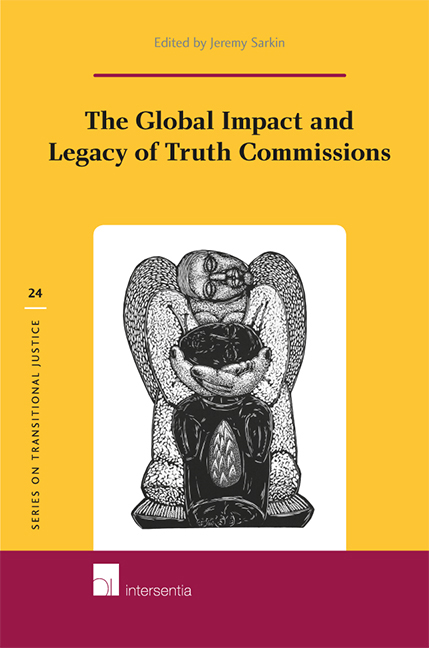Book contents
- Frontmatter
- Acknowledgements
- CONTENTS
- List of Contributors
- Introduction: Contextualising and Understanding the Global Role, Impact and Legacy of Truth Commissions
- Is Anyone Listening? A Review of the Research on Attitudes Towards Truth Commissions
- Assessing the Long-Term Impact and Legacy of Truth Commissions
- The Global Textual Legacies of Truth Commissions: Narratives on Sexual Violence in the Reports of Sierra Leone, Liberia, Kenya and Beyond
- The Implementation Record of Truth Commissions’ Recommendations in Latin America
- In the Aftermath of Truth: Implementing Truth Commissions’ Recommendations on Reparations – Following Through for Victims
- Truth Commissions and Social Justice: ‘Wishful Thinking or Not Very Thoughtful Wishing’?
- Transitioning Toward Dignity
- Towards an Understanding of How Truth Commissions Can Use Their Amnesty Powers to Enhance Their Impact and Legacy
- Truth Commissions in Non-Transitional Contexts: Implications for Their Impact and Legacy
- Surrogacy and Resistance: Evolving Patterns in Unofficial Truth Commissions and Truth Projects
- Index
In the Aftermath of Truth: Implementing Truth Commissions’ Recommendations on Reparations – Following Through for Victims
Published online by Cambridge University Press: 26 June 2019
- Frontmatter
- Acknowledgements
- CONTENTS
- List of Contributors
- Introduction: Contextualising and Understanding the Global Role, Impact and Legacy of Truth Commissions
- Is Anyone Listening? A Review of the Research on Attitudes Towards Truth Commissions
- Assessing the Long-Term Impact and Legacy of Truth Commissions
- The Global Textual Legacies of Truth Commissions: Narratives on Sexual Violence in the Reports of Sierra Leone, Liberia, Kenya and Beyond
- The Implementation Record of Truth Commissions’ Recommendations in Latin America
- In the Aftermath of Truth: Implementing Truth Commissions’ Recommendations on Reparations – Following Through for Victims
- Truth Commissions and Social Justice: ‘Wishful Thinking or Not Very Thoughtful Wishing’?
- Transitioning Toward Dignity
- Towards an Understanding of How Truth Commissions Can Use Their Amnesty Powers to Enhance Their Impact and Legacy
- Truth Commissions in Non-Transitional Contexts: Implications for Their Impact and Legacy
- Surrogacy and Resistance: Evolving Patterns in Unofficial Truth Commissions and Truth Projects
- Index
Summary
INTRODUCTION
Transitional justice emerged after the Second World War as a set of discrete measures, such as trials, truth commissions or reparations, to address the atrocities of a past regime and to transition societies away from the recurrence of atrocities. Since the 1990s there has been an increasing emphasis on the need for multifaceted, comprehensive transitional justice measures to effectively deal with impunity and the consequences of mass violence. It is no longer considered effective to pigeonhole discrete transitional justice mechanisms. Instead there is increasing discussion of a comprehensive package of measures that complement each other. Each of the areas of transitional justice – truth, justice, reparations, amnesties, guarantees of non-recurrence and, to a certain extent, demobilisation, disarmament and reintegration (DDR) – have their own particular focus, benefits and limitations. Although such measures can be complementary, there can also be overlap and tension between them, such as when trying to carry out prosecutions while at the same time seeking to secure truth, which requires careful crafting of social, political, economic and legal factors to avoid derailing the transition itself.
Given that the focus of this chapter is on truth commissions and reparations, it will mainly address the connection between these two measures. Truth commissions and reparations, to a certain extent, have a symbiotic relationship through which they can complement and reinforce one another's goals in acknowledging the atrocities of the past, building social inclusion and trying to vindicate victims's uffering. The first part of this chapter explores the bond between these two mechanisms, drawing upon different examples of how recommendations for reparations are constructed by truth commissions and their justification. The second part of this chapter analyses the implementation of reparation recommendations, finding that in most cases states fail to follow through, or only do so where they are forced by civil society through legal and political pressure. The third part of this chapter briefly discusses transitional societies where reparations are made without a truth commission and their impact on the transition, before reaching a conclusion. As such, it is more likely than not that truth commissions can facilitate the implementation of reparations. That said, transitional societies are complex and fragile, and cannot be easily socially engineered; the past is Often still contested and fought through political and legal forums.
- Type
- Chapter
- Information
- The Global Impact and Legacy of Truth Commissions , pp. 143 - 168Publisher: IntersentiaPrint publication year: 2019
- 1
- Cited by

